Close your eyes and imagine the city of Nashville. Maybe you picture the Cumberland River, the Grand Ole Opry, or the Country Music Hall of Fame.

But maybe you think of a different image: A dozen young women gathered atop a party bus — bedazzled cowboy hats gleaming, pink sashes flying — shouting “Woohoo!” as they toss their caution and, perhaps, a handful of plastic penis straws to the wind.
Welcome to the modern bachelorette party.
Whether you consider bachelorette parties an occasion to splurge with friends, or a scourge tormenting America’s most Instagrammable mid-size cities, one thing is true: They’re big business.
The average cost of a bachelorette party for a group of nine people now tops $10.8k, according to data from the Bach app, an app that helps groups plan, book, and pay for party experiences.
And no business has benefited more than that most quintessential of bachelorette experiences: the party bus. Party buses are the most popular category within the Bach app, says app founder and CEO Mike Petrakis, with the average booking ranging from $600 to $800 for a private tour.
But will buses continue to dominate the bachelorette scene? Or are regulators and venture capitalists about to spoil the party?
Six figures in a weekend
Grant Rosenblatt, 41, started Honky Tonk Party Express with a single bus in 2016. Working his day job in tourism in downtown Nashville, he spotted the opportunity early.
“We saw a trend where these girls were going out, they wanted to dance, they wanted to see Nashville, they wanted to be with their friends, but they didn’t want to be stuck inside a bar,” he says.
Party buses were, by then, a growing business in Nashville and across the US, driven by the rise of bachelor and bachelorette parties.
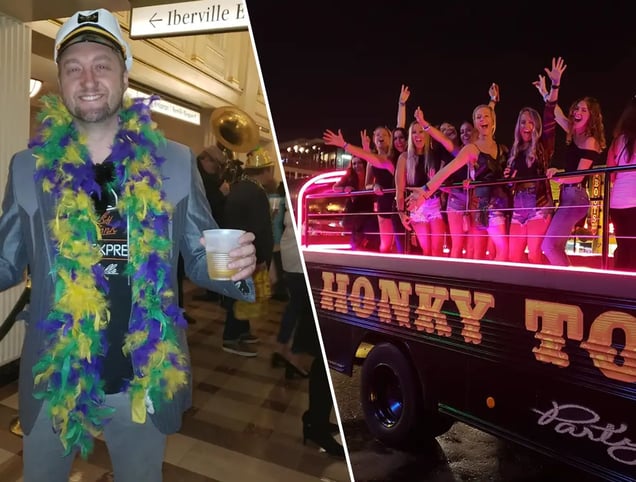
Left: Grant Rosenblatt, founder of Honky Tonk Party Express; Right: A party bus in the wild (via Instagram)
Nashville cemented itself as the leading bachelorette destination in the 2010s. But Rosenblatt says the industry was corny, inefficient, and outdated when he planned his business. He sought to cater to this bachelorette clientele with a bus he called the “ultimate see-and-be-seen vehicle.”
To launch the business, Rosenblatt:
- Asked his best friend (and future business partner) for a $25k loan as startup capital.
- He used the money to buy an old bus (which can range from ~$10k to more than $50k), replace its engine, cut off its roof, and install a bar, adding sound equipment, lighting, and bench seating.
That first bus lasted for a year, he says. “It was made completely out of untreated wood, so all the wood warped. You have to build these buses like you build a boat.”
A bigger challenge came next: figuring out how to insure and regulate a bar on wheels.
The company had to hire commercially licensed drivers, determine health code rules for serving alcohol (Honky Tonk’s buses are BYOB and staffed with a professional bartender), and work with regulators to follow guidelines for the party bus industry.
But the investments paid off quickly. Within a single year, Honky Tonk Party Express was profitable. Today, it’s one of the largest party bus operators in Nashville, with a fleet of 16 buses. (Twelve have city permits, with four held in reserve as backups.)
- According to Bach app CEO Petrakis, Honky Tonk Party Express books seven figures in tours on the app per year, and is the most popular party bus company on the app in the country.
- Rosenblatt declined to discuss specifics about revenue, but said the company has grown every year.
Honky Tonk charges $400-$600 per hour for up to 25 guests for two-hour tours. Rosenblatt’s buses run an average of 12 hours every Friday, 12 hours every Saturday, six hours on Thursdays, and eight on Sundays. With all 12 of his buses running on a given weekend, he could make $150k+.
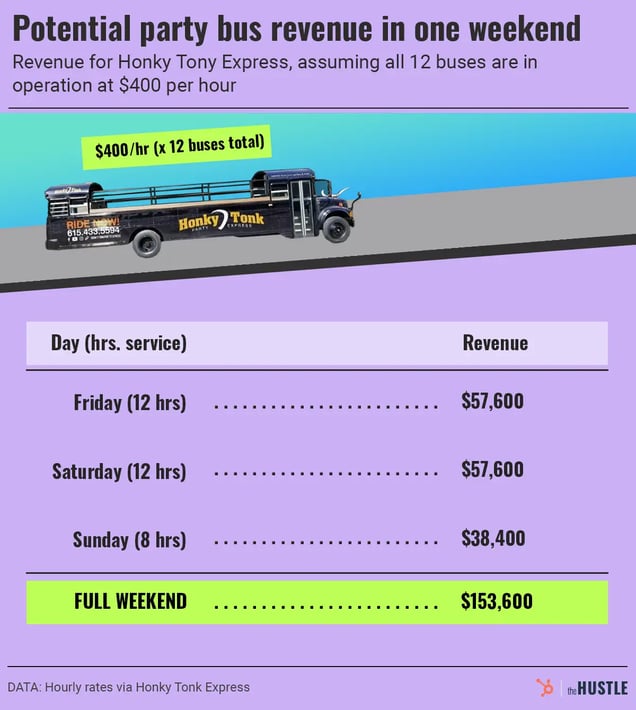
The Hustle
Outside Austin, Texas, another top destination for bachelorettes, Brooke Rogan, 26, is the founder of Brooke’s Bubble Bus, a three-year-old company with 10 bright pink buses, vibrant social media, and a completely booked schedule.
Rogan launched her business at the start of the pandemic when she looked around her hometown of Fredericksburg, Texas, and noticed the local wineries taking off. Why not offer bachelorette wine tours?
She found a pink bus for sale, bought it, and set up a website on GoDaddy. She hired her former Fredericksburg High School principal (who happened to have a commercial license) to drive the first tour.
“It was booked within 24 hours,” she says. “Pink can sell. Pink can sell anything.”
Today, Rogan runs 10 buses each Saturday with 10 to 20 people in each, charging up to $200 per person. She sources her pink vehicles from other limo companies, and ensures every element is festive and Instagram-ready.
What her followers don’t see? “I live at the mechanic shop. I am always at the mechanic. We have a bus breakdown, we have a tire go out, it’s always something.”
Scott Good, owner of Fly-Rides party buses in Austin, has had similar growth and similar costs.
“I am literally booked out — all 10 of my buses — most Saturdays from mid-February through mid-December,” he says.
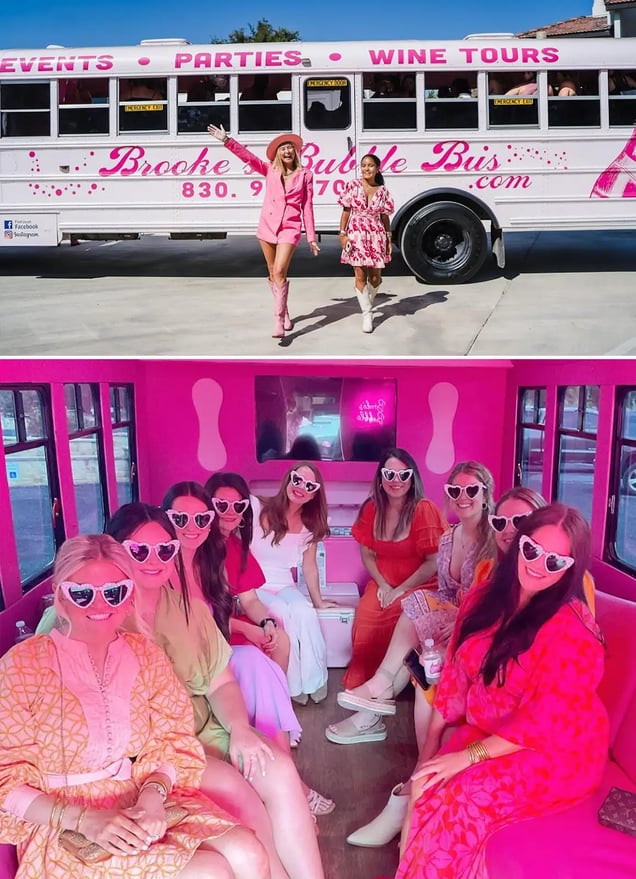
Scenes from Brooke’s Bubble Bus (via Instagram)
This being the party bus business, those customers can be… accident-prone.
“Once or twice a year someone does something dumb,” Good says. “I had a guy stick his hand in an air conditioner. I had a guy smack his head on a door.”
Other companies have been less fortunate. More party buses mean more accidents — leading to greater scrutiny of the industry.
The fight against party buses
On a September day two years ago, students at a high school in downtown Nashville walked around their campus holding signs saying “Do Not Disturb” and “We Deserve To Learn in Peace.”
They were protesting against noisy party buses that passed by their school.
The students said they were disrupted by buses several times a week, including while taking the ACT exam. They also said party bus patrons had flashed them.
“We want peaceful learning,” one student told local reporters. “Not to take away anyone’s livelihoods, not to ban fun. Just for us to be able to learn in peace.”
At the time, the party bus industry faced few regulations. It wasn’t until 2022 that Tennessee legislators passed a law to award legal control of the industry to the city.
Since then, Nashville has tightened laws around the buses, limiting the size of the city’s party bus fleet by granting 89 permits for “entertainment transportation vehicles” in 2022, while turning down 70 permit applications.
Earlier this year, the governing body responsible for awarding permits, the Metro Transportation Licensing Commission, recommended the total number of buses be reduced to 35-70, citing major traffic issues caused by the vehicles.
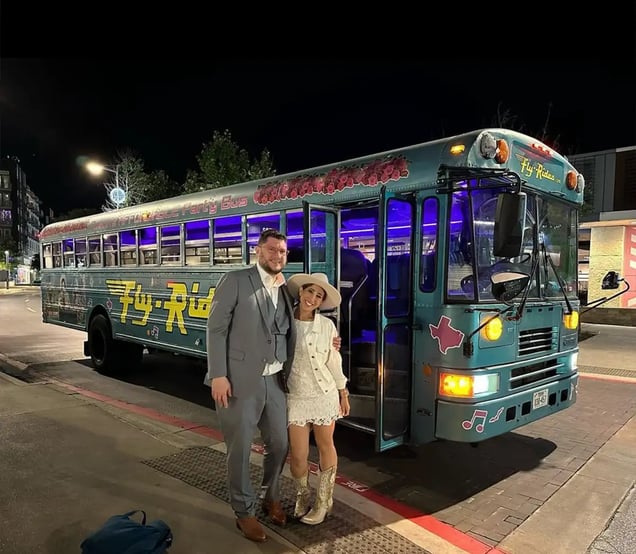
A wedding on Fly-Rides in Austin, Texas (via Instagram)
Many operators believe such a decision would put employees’ livelihoods at risk. Rosenblatt felt so strongly about it that he joined a lawsuit pitting several party bus operators against the city. The operators argued the permit limits were arbitrary.
“I think it’s an overreaction to an issue that has already been handled with pretty damn good regulations,” says Rosenblatt. “If you look at Nashville and what it has become in terms of tourism, everyone says, ‘Nashville has changed.’ Instead of fixing real issues, like crime, sexual assaults going on downtown, all the things you have in a major tourism destination… [party buses] are just the easy scapegoats.”
Industry critics, including many local politicians, have countered that Nashville’s economy, particularly for hospitality and tourism, is strong enough to withstand any losses from the reduction or elimination of party buses.
- Although Nashville is considered a capital for bachelorette parties, one Nashville entrepreneur estimated the city gets 150k bachelorette visitors each year. That accounts for a fraction of the ~14m tourists the city sees annually.
- Nashville’s economy is robust, with a metrowide unemployment rate of 2.7%, as of August.
“The greater risk,” Nashville mayor John Cooper wrote in a letter to the Metro Transportation Licensing Commission, “is that the disruptive effects of these vehicles result in a loss of jobs downtown as office tenants relocate and guests opt to travel somewhere else.”
He added, “There is a public need not to have these vehicles clogging up our public streets and bringing quality of life concerns to our neighborhoods and businesses.”
Still, despite the challenges, Honky Tonk Express is seeing increased demand.
“The reason we’re so wildly successful has nothing to do with our type of bus, or our speaker systems, etc. The reason is because it’s a two-hour safe space for these bachelorettes who ride through downtown Nashville,” Rosenblatt says.
New competition is coming
If regulators don’t force the bachelorette party bus industry to change, venture capitalists and increased competition might.
As the post-covid wedding boom continues —an estimated 2.5m couples got married in 2022, the highest number in 40 years — demand for travel, trips, and parties isn’t slowing down.
That’s brought a new generation of entrepreneurs into the mix to try to transport all those partygoers.
- In Austin, venture-backed Fetii, an app that lets groups book a 15-person van or 30-person bus on demand, was launched in 2021. The app caters to weddings and bachelorette parties, as well as business-related occasions.
- According to its website, Fetii’s charges start at $100 per hour for buses, working out to $5 per hour per person if you have 20 people (far less than many competitors).
- It has since rolled out its services in seven cities across the country, including Dallas; College Station, Texas; and Baton Rouge, Louisiana.
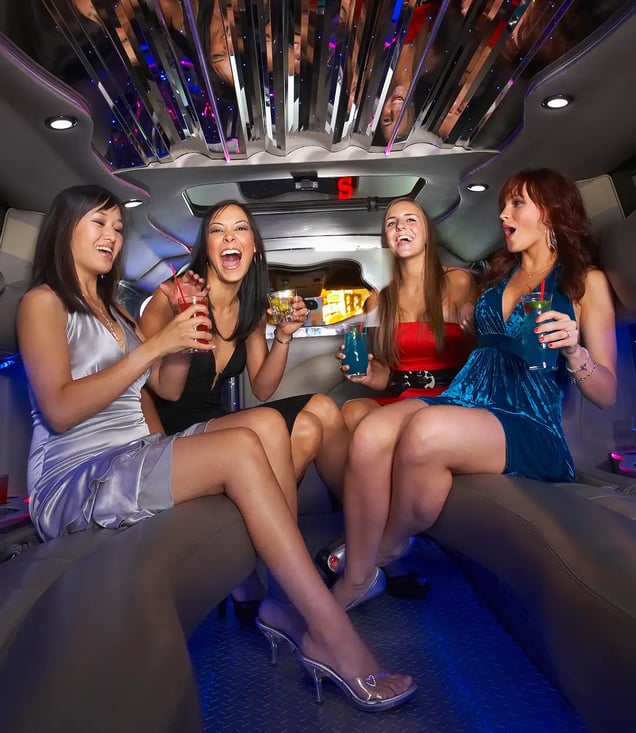
Good times on a party bus (Getty Images)
Good, the owner of Fly-Rides, isn’t worried.
“You’d need four to five of them to compete with my buses,” he says. “Good luck with that when you are moving 200 people from a wedding.”
He notes that similar venture-backed startups like Chariot have come and gone, suggesting the market may be harder to crack than it appears.
Still, I’ve personally seen Fetii’s rise in popularity on the streets of Austin.
On the night before my own wedding, my husband’s groomsmen booked a Fetii to take our bridal party out dancing. I remember watching with astonishment as the van — complete with a disco ball and booming speakers — arrived outside of our house in minutes.
As I settled in, I realized how special it was to have a van full of our nearest and dearest. That’s the ultimate promise of party buses: all of your people in one place, even if it’s just for the night.